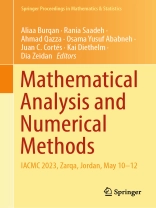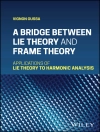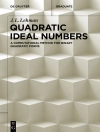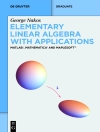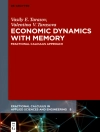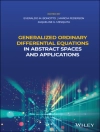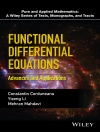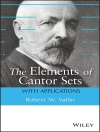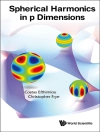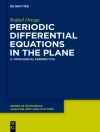This book presents a thoughtful compilation of chapters derived from the proceedings of the 8th International Arab Conference on Mathematics and Computations (IACMC 2023), held at Zarqa University in Zarqa, Jordan, from 10–12 May 2023. Encompassing a broad spectrum of themes crucial to contemporary research and development, the book delved into subjects ranging from partial and differential equations to fractional calculus, from probability and statistics to graph theory, and from approximation theory to nonlinear dynamics. Moreover, it explores pivotal areas such as numerical analysis and methods, as well as fostering interdisciplinary mathematical research initiatives.
Building upon the legacy of its predecessors, IACMC 2023 served as a premier platform for scholars, researchers and industry professionals to converge and exchange insights on a myriad of cutting-edge advancements and practical applications within the realm of mathematical sciences. This volume encapsulates the essence of IACMC 2023, offering readers a comprehensive overview of the latest breakthroughs and trends in mathematical sciences while serving as a testament to the collaborative spirit and intellectual vigor that define this esteemed conference series.
Tabla de materias
R. Elsousy, Abdel-Salam G. Abdel-Salam, Continuous versus Categorical Imputation Method for Unobserved Count with Zero-Inflation.- F. Alsaafin, A. Burqan, Matrix Inequalities for the Difference between Arithmetic and Heinz Means.- Mohammad A. Amleh, Prediction of Future Order Statistics for Step-Stress Model with Frechet Distribution.- Edward L. Boone, R. Ghanam, Optimal Sampling Locations for Fractional Partial Differential Equations Using D-Optimality.- A. Alsoboh, A. Amourah, M. Darus, A. Alahmade, q-Neighborhoods and Partial Sums for Certain Subclasses of Analytic Functions with Negative Coefficients.- M. Shahwan, Lie Algebraic Method for Generating Certain Harmonic Oscillator-like Functions.- Mustafa I. Alheety, M. Qasim, K. Månsson, B. M. Golam Kibria, On Some Weighted Mixed Ridge Regression Estimators: Theory, Simulation and Application.- N. S. Mohammed, Emad A. Kuffi, Dhamyaa H. Al-Nuaimi, Utilize the Complex Sadik Transform to Solution Volterra Integro-Differential Equations of Second Type.- Majd Al-Zoubaidi, Amjad D. Al-Nasser, Entropy-Based Weighted Exponential Regression.- S. Al-Hijjawi, S. Alkhazaleh, Time Effective Fuzzy Soft Set.- Gharib M. Gharib, Maha S. Alsauodi, Rania Saadeh, Worood A. AL-hakim, Bara’a A. Abujarad, Using Medfield Atomic Solution Method to Solve Nonhomogeneous Fractional Partial Differential Equations.- Fuad A. Abushaheen, A Separation Axiom via a New Type of Function in Hereditary bi m-Spaces.- V. Edemskiy, S. Garbar, Large Family of Quaternary Sequences with High Linear Complexity and Period PNQM.- Abed Al-Hakim Majdalawi, Amjad D. Al-Nasser, Fitting Regression Models when Both Variables are Subject to Non-Normal Error Terms.- Ala’a Al-Kateeb, H. Hong, E. Lee, Structure of Cyclotomic Polynomials and Several Applications.- S. Ali Jafar Zaidi, Z. Shoukat, S. Brahim Belhaouri, K. Kassoul, IOT based Face Recognition and Surveillance System using Smart Phones.- H. Hussein, A. Islamand, S. B. Belhaouari, Stress Detection using Novel Time-Frequency Decomposition: Progressive Fourier Transform.- R. Saadeh, M. Mustafa, A. Burqan, Solving Partial Integro-Differential Equations via Double ARA-Formable Transform.- R. Saadeh, L. Hammdi, Ahmad Qazza, Solving Partial Integro-Differential Equations via Double Laplace-Formable Transform.- K. Kassou, S. B. Belhaouari, N. Cheikhrouhou, Particle Swarm Optimization-Based Variables Decomposition Method for Global Optimization.- M. Berir, M. Abdoon, A. Qazza, R. Saadeh, F. El Guma, A Co-oparative Numerical Study of a Classical Model and Fractional Model for Leishmaniasis.- M. M. Shuaib, Modeling Risk and Precautionary Time Factors and Investigating Their Impact on Route Selection Behavior Under Fire Emergency.- A. Alsoboh, A. Amourah, B. Alamri, and M. S. Alatawi, G. Gharib, A Certain Subclass of Analytic Functions Related to q-Calculus and their Second Hankel Determinant.- K. Kassou, S. B. Belhaouari, N. Cheikhrouhou, Particle Swarm Optimization-Based Variables Decomposition Method for Global Optimization.- A. Alsoboh, A. Amourah, M. S. Alatawi, G. Gharib, M. Shatnawi, Exploration of New Classes of bi-Univalent Functions Defined by the Subordination Principle using q-Gegenbauer Polynomials.- M. Rasool, Samir Brahim Belhaouari, Hamza Baali, Image Encryption: An Exploration of Collatz Conjecture to Strengthen Data Security.- B. Abughazaleh, M. Alamleh, A. Al-Natoor, R. Saadeh, Double Mellin-ARA Transform.- O. Al-Refai, Estimating Coefficient Bounds for Classes of bi-Univalent Functions Defined by Fractional Derivatives.- A. Abu Snainah, A. Burqan, W. Audeh, Novel Bounds for Generalized of Logarithmic and Identric Means.- A. Qazza, Efficient Construction Technique for Resolving Dirichlet Boundary-Value Problems in Multiply Connected Domains for Real Elliptic Equations.- S. Al Zubai, A. D. Al-Nasser, Fitting Big Data using Structural Measurement Error Model.- S. Alshorm, I. M. Batiha, J. Oudetallah, Stochastic Population Growth Model using Three-Point Fractional Formula.- T. Eriqat, Moa’ath N. Oqielat, A. El-Ajou, O. Ogilat, S. Momani, Approximate Solutions of the Fractional Zakharov–Kuznetsov Equation using Laplace–Residual Power Series Method.- A. Fareed, S. Hassan, S. Brahim, Reducing Data Sparsity in Movie Recommendation System.- J. Jawdat, Hybrid Nanofluids with Fractional Chaotic Convection.- A. Burqan, Baha’aldeen Alnaddaf, Cristian Conde, Ahmad Al-Natoor, New Refinements of Generalized Numerical Radius Inequalities.- R. Saadeh, B. Ghazal, S. Mashagbeh, Using Double Formable Transform to Solve Fractional Partial Differential.- R. Saadeh, B. Ghazal, Ahmad Qazza, General Transform Decomposition Method.- I. M. Batiha, S. Alshorm, M. Almuzini, Solving Fractional Order Monkeypox Model by New Numerical Methods.- W. A. Almse’adeen, Feras M. Al Faqih, Mohammed Z. Swalmeh, Magnetohydrodynamics Boundary Layer Analysis of Free Convection Flow in the Presence of Casson Ternary Hybrid Nanofluid over a Stretching Sheet.- O. Ramadan, A. Burqan, Refinements of Reverse Young Inequality for Scalars and Matrices.- W. Audeh, A. Boustanji, M. Al-Labadi, Singular Value Inequalities for Increasing Convex Functions of Matrices.- M. Abduljabar Al-Hasawi, Methods of Obtaining the Ridge Parameter K in Multiple Linear Regression Analysis.- Z. Oflaz, S. Brahim Belhaouari, Coupled Hidden Markov Model with Binomial and Truncated Geometric Copula to Investigate Hypertension and Diabetes Multimorbidity Progression.- I. Jebril, S. Alshorm, I. M. Batiha, Numerical Solution for Fractional-Order Glioblastoma.
Sobre el autor
Aliaa Burqan is Associate Professor of Mathematics at Zarqa University. She received her Ph.D. degree in Operator Theory from the University of Jordan, Amman, Jordan in 2013. She has several research papers published in reputed international journals and conferences. She was an active member in the organizing committee of all mathematical conferences held at Zarqa University from 2006 up to now and the chairman of the last three, IACMC 2019, 2022, 2023. She is also serving as a scientific and advisory board member of some educational bodies. During the last few years, she has supervised several master’s students and some of them are continuing their Ph D studies abroad.
Rania Saadeh is Associate Professor of Applied Mathematics at Zarqa University. She received her Ph.D. degree in differential equations from the University of Jordan, Amman, in 2016. She published several research articles in prestigious international indexed journals and conferences. Her research interests focus on boundary integral equation methods, boundary value problems for analytic complex functions, fractional differential equations, mathematical physics and numerical methods.
Osama Yusuf Ababneh is Associate Professor of Applied Mathematics at Zarqa University, Jordan. He received his B.Sc. in Mathematics from Al-Albyet University in 2005, followed by Master’s and Ph.D. degrees at Universiti Kebangsaan Malaysia (UKM), Malaysia, from 2007–2010. Since 2011, he has been the Editor-in-Chief for General Letters in Mathematics. With a portfolio boasting over 40 scientific papers, he actively contributes to the scientific community as a member of scientific committees for various international conferences and as an editorial board member for several scientific journals. Additionally, his research interests include numerical methods and fractional differential equations.
Ahmad Qazza is Professor of Applied Mathematics at Zarqa University, Jordan. He is renowned for his contributions to mathematical sciences and interdisciplinary research. He received his B.Sc. and Ph.D. degrees in differential equations from Kazan State University, Russia, in 1996 and 2000, respectively. His extensive research and academic work focus on fluid mechanics, mathematical modelling and numerical simulations. A dedicated educator and researcher, he is known for his contributions to advancing scientific knowledge and his commitment to student mentorship. He has published numerous peer-reviewed articles and participated in global conferences, emphasizing collaboration and innovation in science and education. His commitment to collaboration and knowledge sharing marks him as a leader in his field, inspiring students and colleagues alike.
Juan Carlos Cortés López is Full Professor at the Department of Applied Mathematics of the Universitat Politècnica de València (UPV), Spain. Since 2009, he has been the Deputy Director of the University Institute of Multidisciplinary Mathematics of UPV (more than 50 researchers), developing his research in the MUNQU group, modeling and uncertainty quantification. His research focusses on the extension of the classical theory of differential equations—ordinary differential equations (ODEs), partial differential equations (PDEs), equations with delay, fractional ODEs, etc.—to the random scenario under the so-called random differential equations (RDEs) approach including mathematical modelling with uncertainty quantification. He has co-authored more than 200 papers and chapters published in international journals and books. He serves as Associate Editor and Guest Editor in more than 10 international journals. He has served as a member of the scientific and organizing committees of more than 30 international conferences around the world, being a plenary speaker in several of them. He has been the advisor of more than 10 Ph D dissertations. He has been the Principal Investigator of several research competitive projects on RDEs and applications.
Kai Diethelm is Full Professor of Mathematics and Applied Computer Science at the Faculty of Applied Natural Sciences and Humanities, Technische Hochschule Würzburg-Schweinfurt, Germany, where he leads the Scientific Computing Laboratory. He holds a diploma in mathematics from Technische Universität Braunschweig, Germany, and a Ph.D. in computer science and a Habilitation in Mathematics, both from Universität Hildesheim, Germany. His research interests include the numerical simulation of technical processes, approximation theory, high-performance computing, and all aspects (analytical and numerical) of fractional calculus. His best-known scientific results include fundamental statements on the existence and uniqueness of solutions to important general classes of fractional ordinary differential equations. Moreover, he has contributed significantly to the development and analysis of numerical algorithms for approximately solving such equations. He is the (co-)author of three well-known textbooks and monographs and has published more than 90 papers in international peer-reviewed journals and proceedings. Furthermore, Kai is on the Editorial Board of several leading international journals such as Fractional Calculus and Applied Analysis, Numerical Algorithms, Journal of Scientific Computing, Computational & Applied Mathematics, and Journal of Computational and Applied Mathematics. He also acts as a member of the steering committee of the International Conference on Fractional Differentiation and its Applications conference series.
Dia Zeidan is Full Professor of Applied and Computational Mathematics at the German Jordanian University, Amman, Jordan, and an Elected Fellow of the European Society of Computational Methods in Sciences and Engineering. An active researcher in developing mathematical and numerical tools for multiphase fluid flow problems for several years, he is recognized for research contributions in applied and computational mathematics with multiphase flows including his creative approaches to teaching and research. His work has been highly interdisciplinary, involving international collaborations with applied and computational researchers. Among various institutional obligations, he has been a visitor of several important international research groups bridging national research infrastructure gaps in Jordan. He serves on several expert review panels, as Technical Editor and Reviewer for several peer-reviewed journals and as Member of several program committees of technical conferences around the world.
